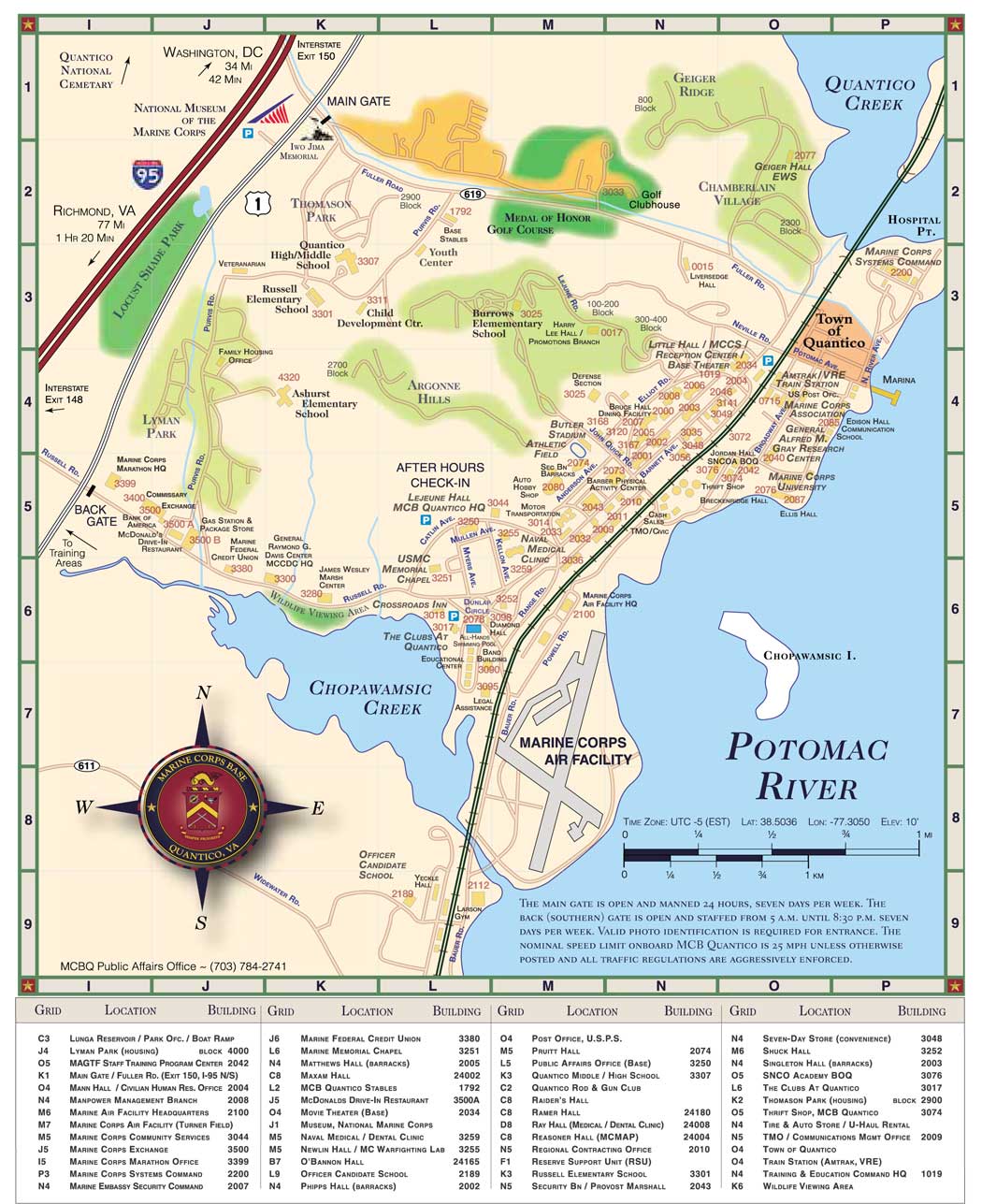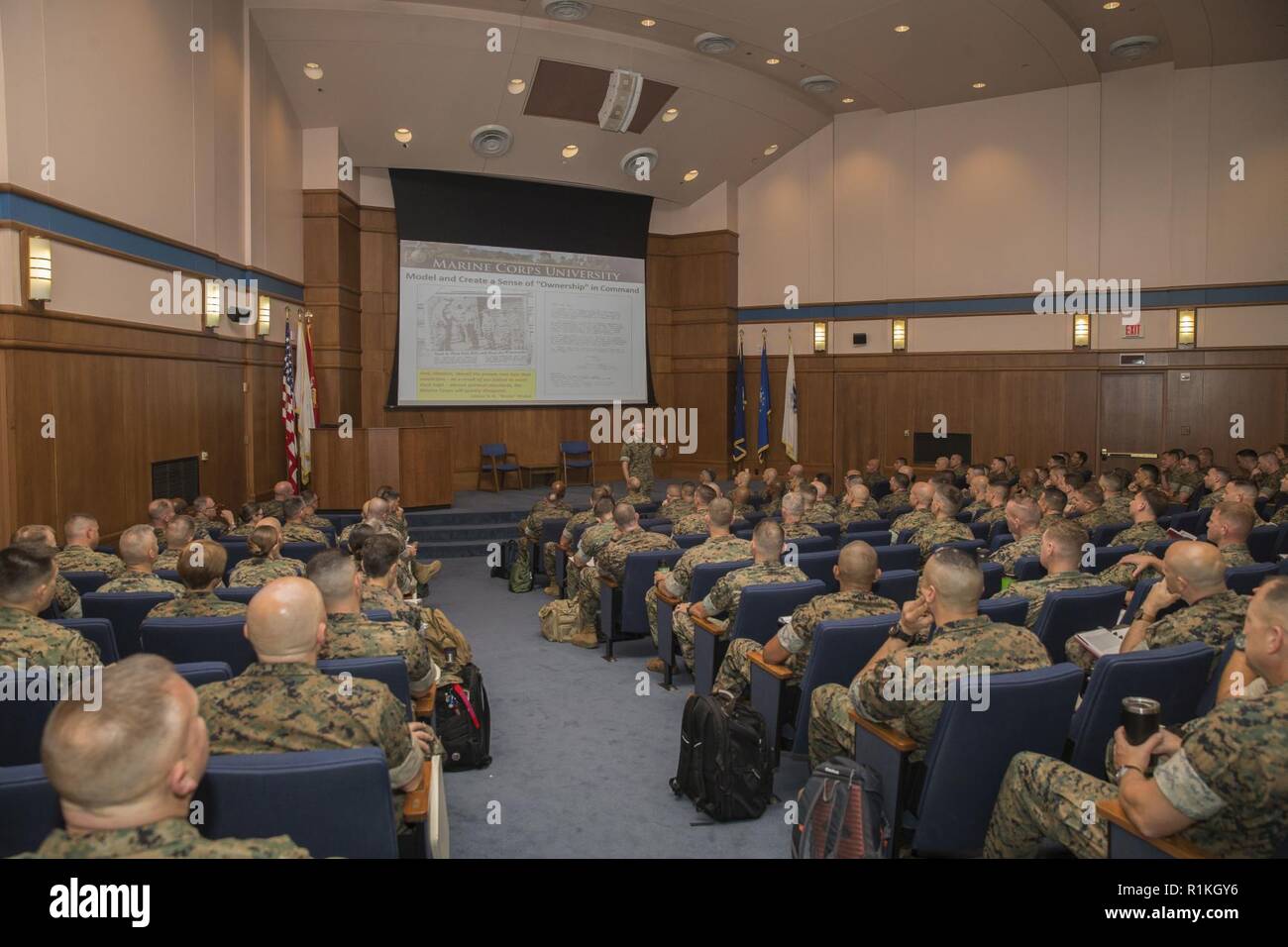Quantico Education Center - General Command, Marine Corps Combat Development Command (CD MCCDC) assumes additional responsibility as Deputy Commandant for Development and Integration (DC CD&I) and is headquartered at General Raymond C. Davis at 3300 Russell Road.
CG MCCDC is responsible for overseeing and supporting the development, implementation and maintenance of education and training programs, and contributing to and supporting the development of Marine Corps forces.
Quantico Education Center

DC CD&I is responsible for developing future operational concepts and determining how best to organize, train, train, and equip the Marine Corps of the future.
Marine Corps Officers Need Better Naval Integration Education
CD&I consists of four directorates: the Naval Combat Laboratory/Future Command, the Capability Development Directorate, the Joint Capability Integration Directorate and the Operations Analysis Directorate.
The Marine Corps Warfighting Laboratory/Future Manager identifies future challenges and opportunities, develops warfighting concepts and comprehensively explores options to inform the warfighting development process to meet the challenges of the future operating environment. It is primarily comprised of six divisions: Concepts and Programs, Wargaming, Science and Technology, Testing, the Rapid Capability Office, and the Navy's Lessons Learned Center.
The Capability Development Directorate develops and integrates warfighting capability solutions that provide an effective and integrated capability for current and future Marine Land Task Forces (MAGTFs), anticipating strategic challenges and opportunities for national defense. It consists of ten components: Total Force Structure, Intelligence Integration, Fires and Maneuvers Integration, Logistics Integration, Information Warfare Integration, Force Protection Integration, MGTF Integration, Naval Expeditionary Warfare Integration, Department of Energy Initiative, and Asset and Personnel Mobility Protection.
Joint Capability Integration Management ensures that new capabilities are created and developed within the joint warfighting framework, and JCIDS proposals are consistent with a unified joint force.
Marine Corps University Dedicates Building To Warner, Simmons > United States Marine Corps Flagship > News Display
The Director of Operations Analysis conducts and provides oversight to the Navy in all matters related to analysis and modeling and simulation.
The mission of Education and Training Command (TECOM) is to develop, coordinate, resource, implement and evaluate education and training concepts, policies, plans and programs to ensure that Marines are prepared to meet the challenges of current and future operational environments. Located in Building 1019, TECOM has the following five major commands: Training Command, Training Command/Marine Corps University, MAGTF Training Command, Parris Island Recruit Corps, and Recruit Corps Depot San Diego. Of these five, the Training Command and Training Command are located at MCB Quantico. TECOM headquarters also has eight divisions on MCB Quantico. Below are brief descriptions of headquarters departments that are not typical of the general staff of a naval command, followed by brief descriptions of Training Command and Training Command and their subordinates.
The MAGTF Training and Education Standards Division (T&E) develops standards for individual, unit, and collective training across all MAGTF components and joint capabilities. The MAGTF Standards Division collaborates with operational forces, schools, and supporters in developing, adopting, and maintaining service-level individual and collective training standards, and standards-based school training programs for service support training. accepts land and professional warfare. assigned to war service. fields

The Aviation Standards Branch is a division of the MAGTF T&E Standards Division and coordinates aviation training efforts, provides uniform service requirements for all aviation training topics, establishes and ensures compliance with aviation training policy throughout the training continuum, and fully aviation develops and maintains a unified A training system capable of preparing and evaluating naval forces in the performance of the six functions of naval aviation.
Fbi Training Academy In Quantico Virginia
The Formal Schools Training Branch is another component of the MAGTF T&E Standards Division that coordinates the planning, scheduling, execution, monitoring and reporting of training sessions throughout the Marine's formal education and training continuum.
The training and education capabilities division identifies, develops and coordinates training and education transfer capabilities in the areas of live, virtual, formative and distance learning to support identified needs.
The Range Management and Training Branch is a sub-component of the T&E Capabilities Division and serves as the executive officer for training ranges and areas. It was established to bring together the expertise needed across the Marine Corps to establish common line policies and programs for all areas. Recent developments regarding access, security, legal issues, weapons development and environmental investments demonstrate the need for the Navy to speak with one voice to protect and modernize our valuable training facilities.
The Training Simulations Branch of the MAGTF is a sub-component of the T&E Capabilities Branch. The MAGTF Training and Simulation Branch identifies, develops, and coordinates MAGTF training model integration and simulation requirements, and supports virtual and non-standard training simulations on the ground to provide Total Force capability training systems.
U.s. Marines Listen As Brig. Gen. William Bowers, Commanding General, Education Command, Speaks To Marines During The Cornerstone Course At Gray Research Center, Marine Corps Base Quantico, Va., Oct. 15, 2018. The
The MAGTF Training Program (MSTP) provides training in MAGTF operations throughout military operations, within the context of a joint and integrated task force environment, to enhance the warfighting skills of senior commanders and their staffs. The MSTP is the only dedicated Commander and Chief of Naval Operations program that provides rigorous and rigorous training in support of USMC operational forces.
The Marine Corps Center for Lessons Learned (MCCLL) owns the MCCLL program process. MCCLL collects and analyzes lessons learned information to produce and disseminate reports and recommendations to assist Marines at all levels. The MCCLL focuses on critical tactics, techniques and procedures for operational forces, identifying gaps and recommending solutions across the DOTMLPF for the Marine Corps.
The Command and Control (C2) Training and Education Center of Excellence serves as the Marine Corps' lead agency for C2 training and education issues in the DOTMLPF process to harmonize the art and science of MAGTF C2 training and education for individual Marines and all levels. of MAGTF commanders and their personnel.

The Training Command at MCB Quantico is one of TECOM's subordinate commands and is the leader in individual skills training for the MOS. TECOM analyzes, plans, develops, sources, implements, and evaluates individualized standards-based training to provide Marines and Sailors with combat-capability for operational forces. The Training Command is comprised of 18 major branch components and 78 subordinate training units at 61 locations throughout the continental United States. There are three subordinate units on Quantico:
Quantico Corporate Center
The Officer Candidate School has been located at Brown Field, Quantico since 1935. The school trains, evaluates and monitors more than 2,500 officer candidates each year to ensure they have the leadership, moral, intellectual and physical potential to successfully serve their commission. company grade officers in operational forces.
There are five training programs through which candidates can be accepted for commission. Officer Candidate Course (OCC), Marine Corps Enlisted Training Program (MECEP), Platoon Leader Course (PLC), Joint PLC and Naval Reserve Officer Training Corps (NROTC). The OCC is a 10-week program designed for candidates who have earned their academic degree and are expected to report directly to the Basic School. Marines who participate in MECEP participate in this program even before they graduate from a civilian university. The PLC program has three possible categories for applicants enrolled in the university.
Students can choose PLC Combined if they want to complete their training in one 10-week program or join PLC Juniors, followed by PLC Seniors, which are two six-week courses. Applicants to the PLC program must complete their degree before receiving their commission. Finally, NROTC is a six-week training program designed for applicants who attend college on an NROTC scholarship for naval options. NROTC candidates, also known as the "Bulldog" program, complete a six-week training program and return to their university upon graduation.
The Base School (TBS) is located at Camp Barrett, Quantico. TBS educates and trains new or commissioned officers to high standards of professional knowledge, morale, and leadership to prepare them for their position as company-level officers in operational forces. TBS places particular emphasis on the duties, responsibilities and combat skills required of a rifle commander. TBS also conducts the Infantry Officers Course (IOC) to educate and train newly recruited infantry and ground intelligence officers. The IOC provides the knowledge, skills, and leadership needed to serve as infantry commanders in the weapons company, and provides advanced career and training ideas. for the weapons company rank. The course also provides basic infantry knowledge, skills and leadership for those officers selected to serve in reconnaissance, sniper and light weapons units.
Of The Best Things To Do In Quantico, Va (2021 Edition)
The Weapons Training Battalion (WTBN) serves as a support base for all aspects of the small arms warfighter in support of the Navy and is a focal point for doctrine, training, competition, equipment and weapons. The battalion, located in Building 27211, provides honors training and support to units in the National Capital Region, as well as Marine Corps Reserve units from across the country. Support is also provided to federal agencies such as the FBI, the Drug Enforcement Agency, and the Bureau of Alcohol, Tobacco and Firearms, and many state and local law enforcement agencies. Within the battalion, the marksmanship training company retrains, coordinates and conducts rifle and marksmanship skills for all National Capital Region soldiers for new Marine officers joining TBS. WTBN is the home of the Marine Corps rifle, pistol and rifle teams. Every year these teams compete
Beaufort sc marine base lodging, marine base in nc, marine base beaufort sc, hotels quantico marine base, camp lejeune marine base, beaufort south carolina marine base, quantico marine base lodging, kaneohe marine base lodging, hawaii marine corps base, beaufort marine, marine corps base beaufort sc, marine air base beaufort sc
0 Comments